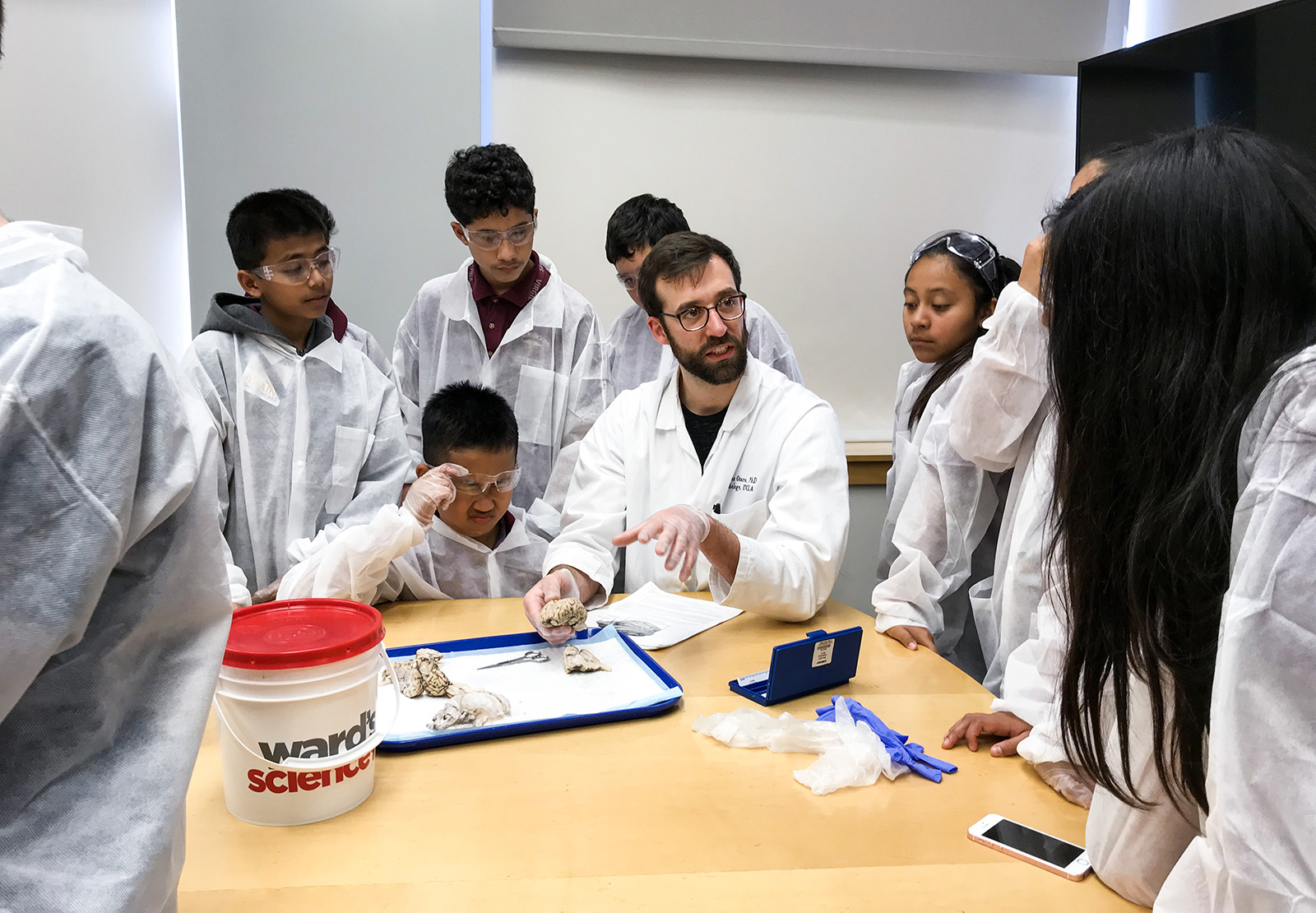UCLA holds Brain Awareness Week for middle and high school students

Posdoctoral researchers used sheep brains to explain neuroscience to middle and high school students at Brain Awareness Week at UCLA from Monday to Friday. (Teddy Rosenbluth/Daily Bruin)
By Teddy Rosenbluth
March 17, 2018 4:52 p.m.
A UCLA postdoctoral researcher displayed a sheep brain in front of 30 middle schoolers while explaining the organ’s importance at an event last week.
“If you get a liver transplant or a kidney transplant or even a heart transplant, you would be the same person,” said Marcus Otero, a neuroscience researcher. “If you were to get a brain transplant, you would not be.”
Dissecting a sheep brain was one of many activities visiting students from local elementary, middle and high schools participated in during Brain Awareness Week at UCLA from Monday to Friday. During the course of the week, 250 students attended lectures, visited laboratories and participated in hands-on activities to learn about neuroscience.
Vidya Saravanapandian, a coordinator for Brain Awareness Week and a doctoral student in neuroscience, said the program is sometimes the only opportunity for students from underrepresented school districts to be exposed to research at a top university.
“Many of the schools in our program wouldn’t ordinarily have the funds for this type of field trip,” she said.
Saravanapandian said she hopes the program, which is free for the students, gives them resources and inspiration to pursue a career in science.
Juan Luis Romero Sosa, a post bachelor neuroscience researcher that presented to the visiting students, said he understands the importance of exposing disadvantaged students to neuroscience because he attended one of the middle schools the visiting students came from.
“When I was a middle schooler, I didn’t really know that research was a job. I always thought that research was what crazy scientists did in cartoons,” he said. “When I got to see labs at UCLA, it was pretty magical.”
During the sheep dissection, students put on oversized lab coats and crowded around volunteer postdoctoral students as they cut through different layers of the sheep brain and described each lobe’s structure and function.
Students had different reactions to the dissection, with some opening their mouths in awe, and others scrunching up their nose at the smell of formaldehyde.
David Beltran, a sixth-grade student, said he found the dissection interesting because he learned how different parts of the brain controlled the body.
“I didn’t know the brain is basically your entire personality,” he said.
During a question and answer session with a panel of neuroscientists, students asked how the researchers became involved in neuroscience.
Melissa Walker, a postdoctoral research fellow in neuroscience at UCLA, told students that the best way to find what they are passionate about is to try new things and hone in on what interests them.
“It’s just as important to close doors as it is to open them,” she said.
Kadidia Adula, a neuroscience doctoral student at UCLA, said she was not always interested in neuroscience, first majoring in art at the City University of New York. She said she became interested in neuroscience research after graduation.
“For some people, they always knew what they were interested in,” she said. “For others they have to explore more.”
Emily Lopez and Zaira Hernandez, sixth-grade students who attended the event, said it was their first exposure to neuroscience.
Lopez said she learned how complex and important the brain is to the body.
“I used to think the brain was so simple, that it just had one job to send a signal,” Lopez said. “Now I know how the brain really is.”
Hernandez said she is considering pursuing a career in neuroscience in the future.
“I learned that scientists don’t know a lot about the brain,” she said. “It makes me want to study what is unknown.”


